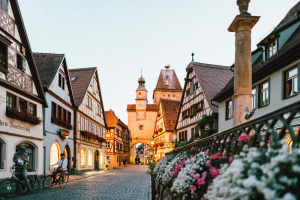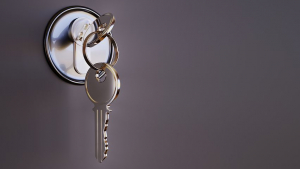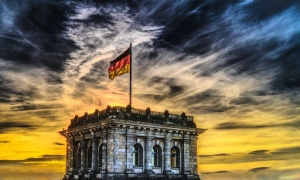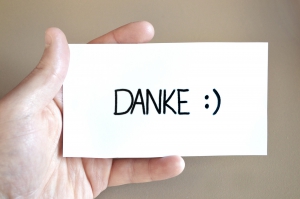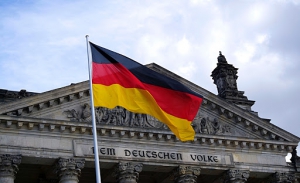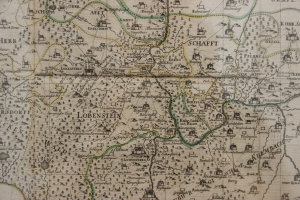“Learning German is what eternity was made for.”
-Mark Twain
Mark Twain may have expressed the difficulty of understanding the German language through his comical quote; however, this does not mean that you cannot learn basic German phrases that will make communication during your sabbatical trip as smooth as ever!
Knowing the basic phrases in any language is important for effective communication at its most basic level. In our series ‘Talk the Talk’ we cover the basic phrases you will need to be able to speak when traveling to another country. Spoken by over 100 million people in the world, German, known as “Deutsch,” is a native language to a number of countries. We have laid out some fundamental German words and phrases, along with their phonetic pronunciation, that can help you get started. If you are thinking about exploring the rich culture of Germany, digging into the treasured history of Austria, discovering the beautiful mountains of Switzerland, or enjoying some authentic Belgian waffles in Belgium, these 35 basic German phrases are sure to do the trick during your sabbatical trip.
Take a look at our compiled list of 35 Basic Phrases in German that will help you during your sabbatical in Germany or any other German-speaking country.
Related: 40 Basic French Phrases for Travelers
Common German Phrases For Travelers
1. How to say Yes in German
“Yes” in German is: Ja
“Yes” in German is pronounced: Ya
2. How to say No in German
“No” in German is: Nein
“No” in German is pronounced: nine
3. How to Say Why in German
“Why” in German is: Warum
“Why” in German is pronounced: Va-room
4. How to Say Me in German
“Me” in German is: Mich
“Me” in German is pronounced: me-ich
5. How to Say You in German
“You” in German is: Sie
“You” in German is pronounced: Zee
6. How to Say How are You in German
“How are you” in German is: Wie geht es Ihnen (formal) Wie geht es dir (informal)
“How are you” in German is pronounced: Vi get es inen (formal), Vi get es deer (informal)
7. How to Say Yes please in German
“Yes please” in German is: Ja, bitte
“Yes please” in German is pronounced: Ya bitt-e
8. How to Say No thank you in German
“No thank you” in German is: Nein, danke
“No thank you” in German is pronounced: Nine dang-ke
9. How to Say Good in German
“Good” in German is: Gut
“Good” in German is pronounced: Goot
10. How to Say Friend in German
“Friend” in German is: Freund
“Friend” in German is pronounced: fro-ind
11. How to Say What is Your Name in German
“What is your name” in German is: Wie heißen Sie?
“What is your name” in German is pronounced: Vee hie-ssen zee
German Greeting/Farewell Phrases
12. How to Say Hello in German
“Hello” in German is: Hallo
“Hello” in German is pronounced: Ha-lo
13. How to Say Good Morning in German
“Good morning” in German is: Guten Morgen
“Good morning” in German is pronounced: Goot-en mor-gen
14. How to Say Good Afternoon in German
“Good afternoon” in German is: Guten Tag
“Good afternoon” in German is pronounced: Goot-en targ
15. How to Say Good Evening in German
“Good Evening” in German is: Guten Abend
“Good Evening” in German is pronounced: Goot-en ar-bent
16. How to Say Good Night in German
“Good Night” in German is: Gute Nacht
“Good Night” in German is pronounced: Goot-en nacht
17. How to Say Goodbye in German
“Goodbye” in German is: Auf Wiedersehen (formal) Tschüs (informal)
“Goodbye” in German is pronounced: Owf vee-der zay-en
German Etiquette Phrases
18. How to Say Excuse me in German
“Excuse me” in German is: Entschuldigen Sie
“Excuse me” in German is Pronounced: Ent-shool-dig-en zee
19. How to Say No Problem in German
“No Problem” in German is: Kein Problem
“No Problem” in German is Pronounced: Kain Problem
20. How to Say You’re Welcome in German
“You’re welcome” in German is: Bitte
“You’re welcome” in German is pronounced: Bit-ah
21. How to Say Bless You in German
“Bless you” in German is: Gesundheit
“Bless you” in German is pronounced: Gez-und-hait
Basic German Phrases To Help You Get Around
22. How to Say Do you speak English in German
“Do you speak English” in German is: Sprechen Sie Englisch
“Do you speak English” in German is Pronounced: Shprexh-en zee eng-lish
23. How to Say Can you Help Me in German
“Can you help me” in German is: Können Sie mir behilflich sein
“Can you help me” in German pronounced: Ekern-en zee meer be-hilf-lixh ziyn?
24. How to Say Where is in German
“Where is” in German is: Wo ist
“Where is” in German is pronounced: Voe ist
25. How to Say How Much in German
“How much” in German is: Wie viel
“How much” in German is pronounced: Vee-feel
26. How to Say What is That in German
“What is that” in German is: Was ist das
“What is that” in German is pronounced: Vass ist dass
27. How to Say I don’t Understand in German
“I don’t understand” in German is: Ich verstehe nicht.
“I don’t understand” in German is pronounced: Ixh fair-shtay-er nixht
28. How to Say How do you say ___ in German”
“How do you say ___ in German” is: Wie heißt ___ auf deutsch?
“How do you say ___ in German” is pronounced: Vee heist ___ owf doytch
29. How to Say Could You Repeat That Please in German
“Could you repeat that please” in German is: Können Sie das bitte wiederholen
“Could you repeat that please” in German is pronounced: Kern-en zee dâs bi-te veeder-holen
30. How to Say Just a Moment in German
“Just a moment” in German is: Moment, bitte
“Just a moment” in German is pronounced: mo-ment, bi-tuh
31. How to Say It Hurts Here in German
“It hurts here” in German is: Es tut hier weh
“It hurts here” in German is pronounced: It toot heer veh
32. How to Say I’m Sorry to Bother You, But in German
“I’m sorry to bother you, but” in German is: Es tut mir leid, Sie zu stören, aber
“I’m sorry to bother you, but” in German is pronounced: It toot me song, zee tzu shtoo-ren, ah-ber
German Housing-Related Phrases
33. How to Say Do You Have an Extra Key in German
“Do you have an extra key” in German is: Hast du einen extra schlüssel
“Do you have an extra key” in German is pronounced: Ast-du ey-nen zusat slischen-shlu-se
34. How to Say Are Utilities Included in German
“Are utilities included” in German is: Sind Strom, Gas und Wasser enthalten?
“Are utilities included” in German is pronounced: Zind strom, gad, unt vas-a ent-aiten
35. How to Say Where is the Closest Supermarket in German
“Where is the closest supermarket” in German is: Wo ist der nächste Supermarkt?
“Where is the closest supermarket” in German is pronounced: Voo ist-de nie-ste zupa-marcht
Related: Talk the Talk: Spanish
History of German Language
Let us go into a brief history of the German language, covering the system of the language, the importance, and significance of German, and some of the differences between German dialects.
The German language is known as “Deutsch” and is spoken by over 100 million people worldwide. In fact, German is the fourth most popular language amongst language learners, following English, French, and Mandarin. In the European continent alone, German is the most widely spoken language, discounting Russia and Eurasia. The German language is the native language of the following countries: Germany, Austria, one of the three official languages of Switzerland, and one of the three official languages of Belgium.
German, along with English, Dutch—also known as Netherlandic Flemish—and Frisian, belongs to the West Germanic group of the family of the Indo-European language.
In its written form, German is known to be a uniform language. What this means, is that written German is standard, and will not greatly differ across its spoken countries, in the same way that English in its written form does not differ across the United States, and the British Commonwealth.
German is a very popular amongst foreign language courses, especially due to the fact that it is one of the principal languages within the Western World. Surprisingly, German is a language that an English-speaker, especially, can learn to master. The reason for this, is that German and English have the same Germanic roots; 40% of words in German sound similar to those that are equivalent in English. A segment of German words have Greek and Latin backgrounds, with a few of them being derived from French and Modern English.
“It might be hard, but it’s still more logical than English… The English language was carefully, carefully cobbled together by three blind dudes and a German dictionary.”
-Dave Kellett
German is part of the group of inflected languages. Inflected languages include the languages of Polish, Latin, and Finnish. These languages are languages that change the endings or the forms of certain words when the way that they are being used within specific sentences also change. As an inflected language, German includes four individual cases for nouns, pronouns, adjectives, and verbs, including both strong and weak. German adjectives include genitive, nominative, accusative, and dative adjectives. German is also comprised of three genders—the feminine, the masculine and the neutral.
The first time that German was recorded to have been spoken in human history is in the first century BC, when interacting with the Romans. During this time, the language had very minor differences in dialect across geographical locations, as there was only one Germanic language. In the sixth century AD, however, German in its spoken form began to form a few different German dialects. These dialects belong to either the High German group, or the Low German group. Read on, as we will get into the details of High German and Low German in our next section, below.
Related: 10 Reasons to Take an Unpaid or Paid Sabbatical
High German versus Low German
“Wir können alles. Außer Hochdeutsch”
–Baden-Württemberg
“We can do everything, except speaking standard German”
–Baden-Württemberg
The different dialects that have been formed within the German language have created a culture that converges different local dialects. Sometimes, in order to speak from your heart, Germans may feel the need to intersperse their local dialect into their conversations.
High German is the official standard written and spoken language of Germany and is the language of the southern highlands of the German country. The main difference between High and Low German are their different sound systems. These differences in their sound systems are principally found in the consonants. It is important to note, that High German and Low German do not relate to the specific dialects that are used to divide a high-class society from a low-class society. Many individuals who come from both societal classes will speak both High German and Low German respectively.
High German
High German is referred to as “Hochdeutsch.” In the geographical region of the highlands of Southern parts of Germany, there was a group of dialects that were spoken, which had no standard literary language. These dialects are now referred to as “Old High German,” and were spoken until around the year 1100. Following the year 1100, a time which was known to be the Middle High German ages, a standard German language began to be formed. The standard High German dialect interestingly owes much to Martin Luther and his translation of the Bible in Middle German. Martin Luther was a German monk, who is responsible for beginning the Protestant Reformation during the 16th century. He is an inspirational figure for the history of Christianity and is known to have been one of the most controversial and dominant figures for the history of the Christian religion. The Middle High German dialect was also the language that was used in the very well-known and famed Nibelungenlied, a series of extensive epic poetic literature during 13th century Germany.
Upper German dialects include High Francocian, Alemannic (Swiss German), and Austro-Bavarian. The Standard High German dialect today, is the most common dialect of German that is used. It is spoken in the central and southern highland parts of Germany, Switzerland, and Austria, and is used in mass media across Low German dialect areas as well as High German dialect areas. High German is also used for academic texts, literature, administration, and higher education.
Related: Taking a Sabbatical? What You Need to Know
Low German
Low German is referred to as “Niederdeutsch,” or “Plattdeutsch.” This German dialect has close relations to Old English (Anglo-Saxon) and Old Frisian. People who come from the Northern parts of Germany typically speak Low German, and it is considered as their vernacular language. Interestingly, Low German is related more closely to Dutch than it is to standard German.
Low German is a vernacular language spoken in much of northern Germany, more closely related to Dutch than to standard German. It was developed from Middle Low German and the Old Saxon dialect. Low German was spoken by natives of the Hanseatic League. The Hanseatic League was a North German federation unifying cities that were formed during the 1300s for the facilitation of trade and the protection of mutual interests. This dialect has no single modern literary standard. The decline of the Hanseatic League and the wide use of Scandinavian languages also led to the decline of Low German throughout time.
Despite its decline throughout the years, the Low German is still very widely used across Northern Germany, with a small amount of literature being written in Low German in these geographical areas as well.
Learn basic phrases in a foreign language to help ease traveling to another country. Let us know what you think! Connect with us on Twitter, LinkedIn, Facebook, Instagram, YouTube and Pinterest.






